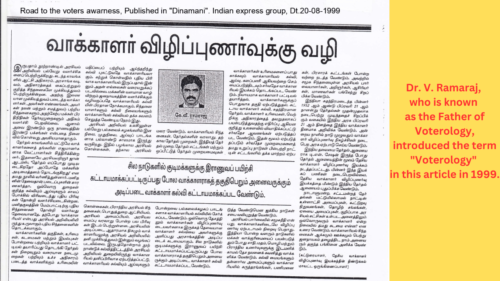Introduction to “Voterology”
 The Indian Express Group has been releasing daily newspapers in India in both English and regional languages since 1932. The term “Voterology” made its debut in a publication on August 20, 1999, in the Tamil newspaper “Dinamani” by the Indian Express Group. The mentioned article penned 25 years ago, introduces the term “Voterology” and explores its unique characteristics and upcoming requirements. Below is the English version of the article to help you comprehend the concept of “Voterology.”
The Indian Express Group has been releasing daily newspapers in India in both English and regional languages since 1932. The term “Voterology” made its debut in a publication on August 20, 1999, in the Tamil newspaper “Dinamani” by the Indian Express Group. The mentioned article penned 25 years ago, introduces the term “Voterology” and explores its unique characteristics and upcoming requirements. Below is the English version of the article to help you comprehend the concept of “Voterology.”
“Political science has seen numerous advancements in the twentieth century. During these time periods, there has been a newfound significance placed on ideas such as power, forms of governance, and methods of obtaining power. The importance of voter’s rights and responsibilities, voters’ opinions, the role of voters in the electoral process, voter studies and research have not advanced significantly. However, it is crucial to keep in mind both are two sides of the same coin.
Candidates only present voters as their masters when it is time for elections. This is how the political scientist John Adams described in his book as “When the election ends, the slavery of the people begins.” The reason creation exists is man’s necessity. Studies and research in various fields continue to grow, leading to the emergence and advancement of new fields. Innovation is essential for the progress of humanity. Currently, “Voterology” marks the start of innovative concepts originating from the field of political science.
The research and study of voters, including voter’s qualifications, rights, duties, behaviour, election systems, voter list preparation, election systems, the procedures from the preparation of voter list to the completion of elections and the value of the right to vote (supreme power), is known as “Voterology”. The scope of “Voterology” as a new field of study has not been defined yet. The main purpose of “Voterology” education is to pave way for a prosperous life, democracy and the development of the people. “Think tanks and educational institutions should start focusing on Voterological Studies and Research” without delay.
Political Science has been a popular subject for undergraduate, graduate, and research programs in universities across the globe for many years. There are numerous divisions such as Ancient Political Thoughts, Contemporary Political Thoughts, Regional Political Thoughts, Public Governance, History of Political System, etc. The electorate, the fundamental source of politics, has not been given adequate importance in political science. Currently, within the realm of education, there is a need for the establishment of a distinct department for voter studies and research (Voterology) independent from the discipline of political science. Voterology as a university subject should cover electoral ideas, election history, modern electoral systems, electoral laws, and comparative electoral systems. Mandatory “Voterology” education should be required for all potential voters, similar to how some countries mandate military training for their citizens.
It is necessary to start a global movement of voters to safeguard their rights and improve voter education, research, and fieldwork. Creating an unbiased voter list, ensuring the eligibility of voters, educating voters, holding free elections, protecting voter rights, and preventing power abuses for winning should be addressed on a global scale with the establishment of international laws on voterology. The United Nations must require its member states to adhere to these instruments and implement necessary law revisions accordingly in their countries.
From a political point of view, social justice cannot be achieved without awareness among the electorate. In developing nations, people should vote without considering caste, religion, language, or regional beliefs and instead focus on what is best for the country. Educational institutions and voluntary organizations should organize seminars, workshops, and campaign meetings focused on Voterology. Socially minded political observers, scholars, teachers, students etc. should participate and highlight the studies and research on Voterology.
Every voter must be aware of their responsibilities within all democratic institutions, such as parliamentary elections, local government bodies, cooperatives, including political parties. We all need to do our share in ensuring the success of democracy by being innovative and promoting voterological thinking”. (Courtesy: “Dinamani Tamil Daily”)
Dr. V Ramaraj first introduced the term “Voterology” in the above article in 1999. He brought forth the concept of “Voterology”, discussing its significance and requirements. At a gathering of voluntary organizations involved in the Indian National Voter Awareness Campaign in 2000, Dr V. Ramaraj was named the “Father of Voterology”. He was the District Coordinator for Voluntary Organizations in the National Voter Awareness Campaign. He authored the book “To the Hon’ble Voter” and multiple articles on voting.
Even at present, the importance of electoral education has not been emphasized. The Journal of Voterology and Research – https://jovar.researchpark.in/ has been launched to overcome this. An International Institution of Voterology and Research will soon be launched to promote studies and education on voters. Let’s enhance voterological education! Let’s strive for the success of democratic principles!
Journal of Voterology and Research – https://jovar.researchpark.in/
International Institution of Voterology and Research – www.voterology.in Coming soon.
International Society of Voterology – Coming Soon.
